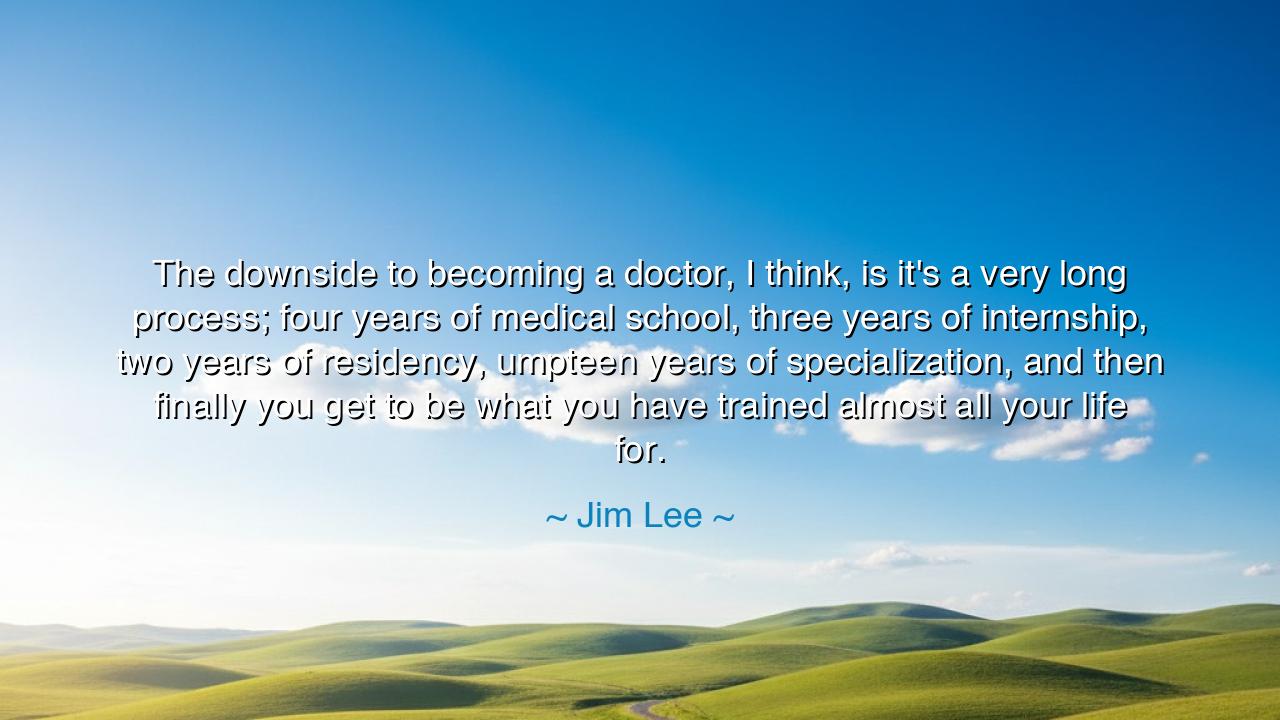
The downside to becoming a doctor, I think, is it's a very long
The downside to becoming a doctor, I think, is it's a very long process; four years of medical school, three years of internship, two years of residency, umpteen years of specialization, and then finally you get to be what you have trained almost all your life for.






The words of Jim Lee—“The downside to becoming a doctor, I think, is it's a very long process; four years of medical school, three years of internship, two years of residency, umpteen years of specialization, and then finally you get to be what you have trained almost all your life for”—speak not merely of the journey of medicine, but of the endurance required to fulfill any noble calling. In his reflection lies the essence of human striving: that greatness is not granted in a moment but forged through time, through repetition, through years of unseen labor. His words remind us that every profession of depth, every pursuit of mastery, demands from us not only skill but patience—the rarest virtue of all.
In the age of the ancients, those who sought wisdom were made to wait. The philosophers of Greece trained their disciples not in days but in decades. Before one could speak of virtue, he had to live it. Before one could heal, he had to watch suffering. The physician’s art, like the philosopher’s, was not a trade but a transformation—a refining of the soul. Jim Lee’s observation that it takes “almost all your life” to become what you were meant to be is not an exaggeration; it is a truth that echoes through history. True mastery consumes time, for time alone tempers the heart that must carry great responsibility.
Consider the story of Hippocrates, the father of medicine. He studied for years under his elders, traveling across the islands of Greece and Egypt to learn the mysteries of the human body. Yet even after decades of practice, he confessed that the art was longer than a lifetime. “Ars longa, vita brevis”—art is long, life is short—he declared. To be a doctor, or to be a master of any craft, is to dedicate oneself to an ideal that one may never fully reach. It is to walk a road that stretches beyond one’s years, knowing that each step is both an offering and a preparation for the next.
Jim Lee’s words also reveal the quiet sorrow of sacrifice. For in the pursuit of greatness, something must always be surrendered. The doctor gives his youth to study, his sleep to duty, his peace to the needs of others. Years blur together in the service of a promise—the promise that one day he will stand tall and say, “Now I am ready.” Yet when that day comes, he is no longer the same person who began. The long road does not simply train the doctor’s hand; it transforms the spirit. It replaces impatience with wisdom, pride with humility, and fear with endurance.
In truth, this is the paradox of all long journeys: the goal that once seemed so distant becomes less important than the transformation that occurs along the way. The artist, the scientist, the teacher, the healer—each must endure years of obscurity, frustration, and labor before tasting the reward. And yet, it is in that labor that their souls are strengthened. To wait is to grow; to persist is to awaken. The fire of dedication is not lit once but fed endlessly through the trials of time.
There is also a universal lesson here about purpose. In a world obsessed with speed, where success is measured in instant gains, the doctor’s path stands as a sacred reminder that some things must be earned slowly. The long process—the “four years, three years, two years, umpteen years”—is not a burden but a blessing. It weeds out the fickle and refines the faithful. For those who cannot endure the wait cannot bear the weight of the calling. Every hour spent learning, every sleepless night spent studying, becomes a brick in the foundation of integrity.
The lesson of Jim Lee’s words is thus clear: greatness asks for your years. To build something eternal, you must offer time as your tribute. Do not rush the process, for the process itself is the making of you. When the path feels endless, remember that every step is sacred—that patience itself is a form of devotion. Like the physician who studies through decades, tend to your craft with care and constancy. Mastery is not a destination but a pilgrimage, and those who walk it with perseverance will, in the end, find that what they have been training for is not merely their profession—but the perfection of their soul.
So, my child, if you grow weary upon your journey, recall this truth: the long road is the right one. Whether your path is in medicine, art, or faith, walk it with courage. Do not envy the quick climbers, for their summits are short-lived. Walk steadily, as the ancients did, step by step, through the fire and the years. And when at last you reach your purpose, you will find that the time you thought you lost was, in truth, the time that shaped you into the person worthy of that destiny.






AAdministratorAdministrator
Welcome, honored guests. Please leave a comment, we will respond soon